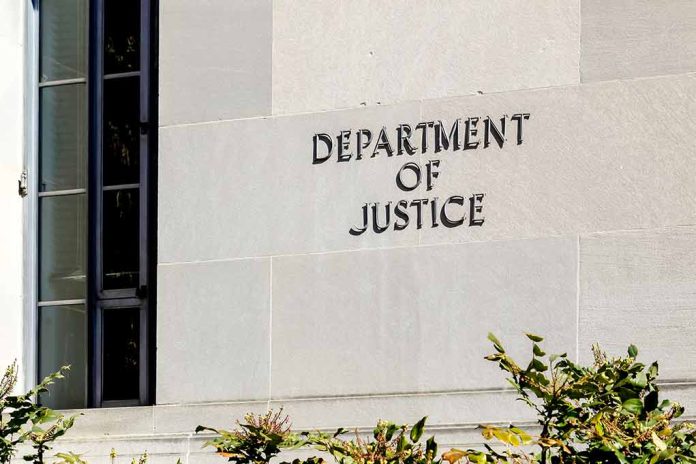
President Trump’s Department of Justice firmly rejects contempt allegations in the Abrego Garcia deportation case, signaling they will no longer tolerate judicial overreach in matters of foreign policy.
Key Takeaways
- The DOJ has rejected contempt accusations in the Abrego Garcia deportation case, emphasizing the limits of judicial authority in foreign policy matters.
- President Trump’s administration maintains that Abrego Garcia is an MS-13 gang member, conflicting with his legal team’s denials.
- The Supreme Court’s order to “facilitate” Abrego Garcia’s return is being interpreted by the DOJ as removing domestic obstacles, not compelling diplomatic actions.
- Judge Paula Xinis has demanded daily updates on efforts to return Abrego Garcia from El Salvador, where he was mistakenly deported.
- The DOJ argues that courts cannot direct the Executive Branch on foreign relations, citing the President’s exclusive constitutional authority.
DOJ Draws Constitutional Line in Abrego Garcia Case
In a decisive legal maneuver, President Trump’s Department of Justice has responded to attorneys seeking a “show cause” order for government contempt in the high-profile Abrego Garcia deportation case. The DOJ’s filing systematically dismantles accusations that the administration has failed to comply with judicial orders, instead asserting the constitutional limitations of court authority in matters of foreign relations and diplomatic engagement with sovereign nations.
Kilmar Armando Abrego Garcia was deported to El Salvador despite a removal order specifically stating he should not be sent there due to potential gang-related threats. This error prompted a legal battle culminating in a Supreme Court ruling directing the administration to handle his case as if the improper deportation had never occurred. However, the exact interpretation of this directive has become a point of significant contention between the judiciary and executive branches.
A deputy assistant attorney general told the judge overseeing the case of Kilmar Armando Abrego Garcia, the Maryland man who was deported to El Salvador in error, that he does "not have the information" regarding Abrego Garcia's whereabouts. https://t.co/KcZDdBsLDf
— ABC News (@ABC) April 11, 2025
Constitutional Authority and Judicial Limits
The Trump administration has taken a firm stance on the constitutional separation of powers. In its filing, the DOJ emphasized that federal courts lack authority to direct the Executive Branch in matters of foreign relations. The administration argues that Judge Paula Xinis’s demands exceed judicial authority by attempting to dictate how the President conducts international diplomacy with El Salvador, where Abrego Garcia is currently detained.
“The relief sought by Plaintiffs is inconsistent with the Supreme Court’s instruction requiring this Court to respect the President’s Article II authority to manage foreign policy,” states the DOJ brief, directly challenging the court’s authority to oversee diplomatic negotiations.
The administration’s legal team has offered a precise interpretation of the Supreme Court’s directive to “facilitate” Abrego Garcia’s return. According to the DOJ, this term refers specifically to “taking all available steps to remove any domestic obstacles that would otherwise impede the alien’s ability to return,” not compelling diplomatic actions that could violate another nation’s sovereignty.
Judicial Frustration Meets Executive Restraint
Judge Xinis has expressed mounting frustration with what she perceives as government inaction, ordering daily status reports on efforts to return Abrego Garcia. During a recent hearing, the judge pointedly questioned government representatives about their concrete actions, stating, “The Supreme Court has spoken quite clearly. And yet, I can’t get an answer today about what you’ve done in the past, which means, again, the record as it stands, is that nothing has been done.”
The DOJ maintains that Abrego Garcia is alive and secure in El Salvador, detained under that country’s domestic authority. Officials note that diplomatic discussions are ongoing but subject to international protocols and possibly protected by attorney-client and State Secrets privileges. The administration argues that additional court supervision beyond the already contested daily updates would constitute improper judicial interference in sensitive diplomatic processes.
MS-13 Affiliation Dispute
A significant factual dispute underlies the case: the Trump administration maintains that Abrego Garcia is an MS-13 gang member, a claim his legal team vehemently denies. This disagreement has implications for both the urgency of his return and the security considerations involved in bringing him back to the United States. The administration’s position appears to be that proper vetting and security protocols must be followed regardless of judicial timelines.
“Any further intrusion into this sensitive process—and any directive from the Court to take action against the nation of El Salvador—would be inconsistent with the care counseled by the Supreme Court,” the government argues in its filing, emphasizing the delicate nature of international negotiations.
As this constitutional showdown unfolds, the DOJ’s position reflects President Trump’s broader approach to executive authority: asserting robust presidential powers in matters of foreign affairs while respecting judicial authority in appropriate domestic contexts. The outcome of this case could establish important precedents regarding the judiciary’s ability to compel executive action in international matters.
Sources:
- ‘Nothing has been done’: Judge slams DOJ in case of wrongly deported man – ABC News
- DOJ: Courts have ‘no authority’ to force Abrego Garcia’s return
- Trump’s Department of Justice Tells Judge They’re No Longer Amused Playing Her Silly Games



